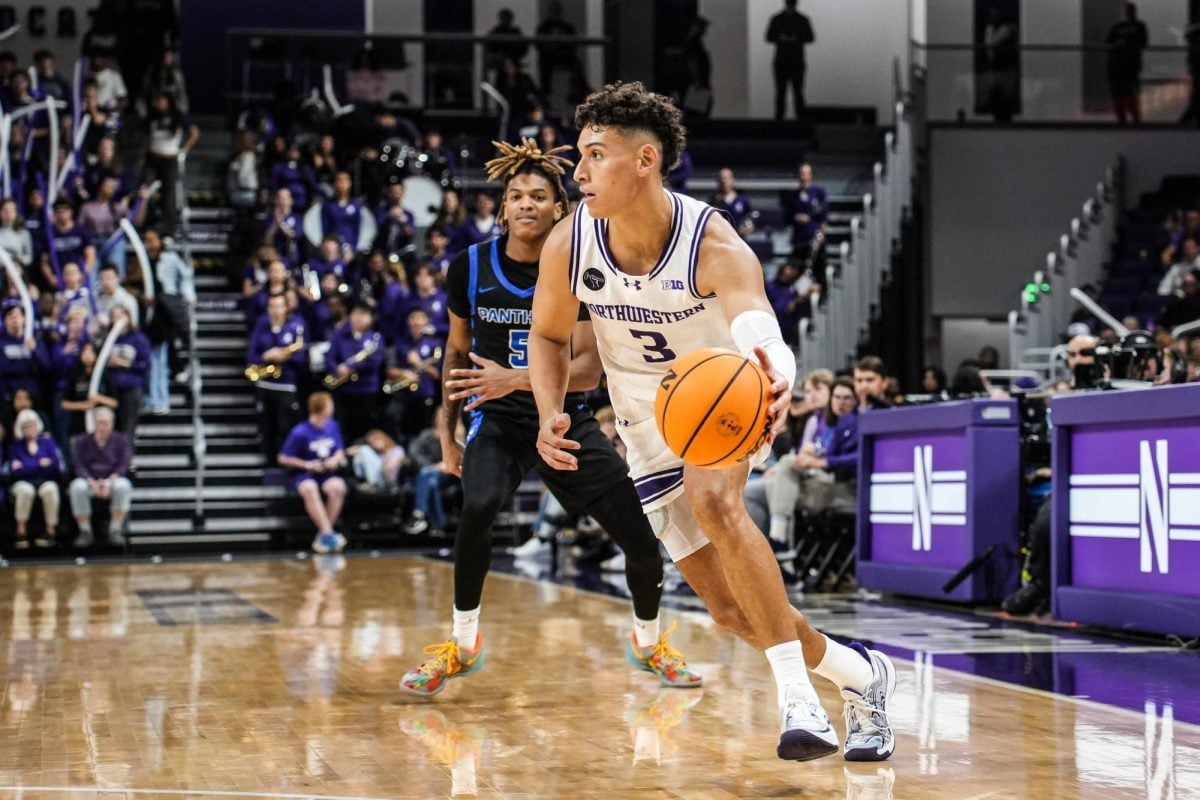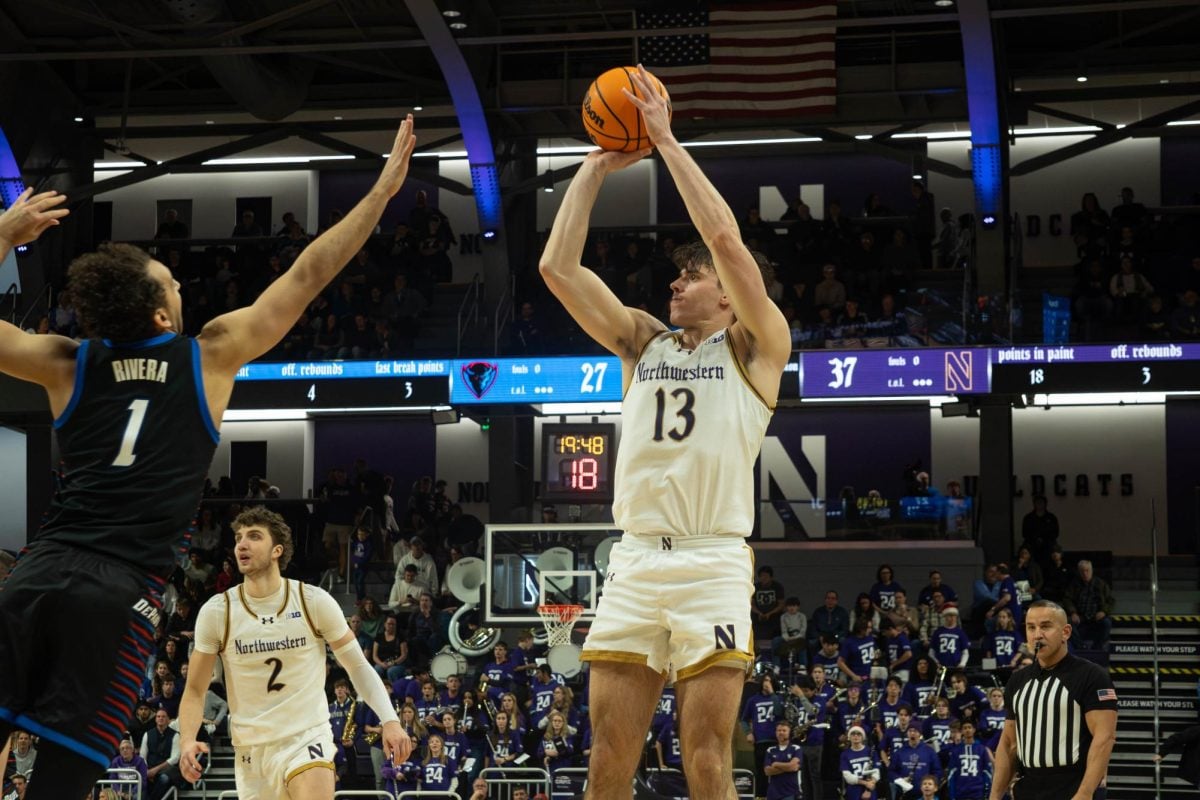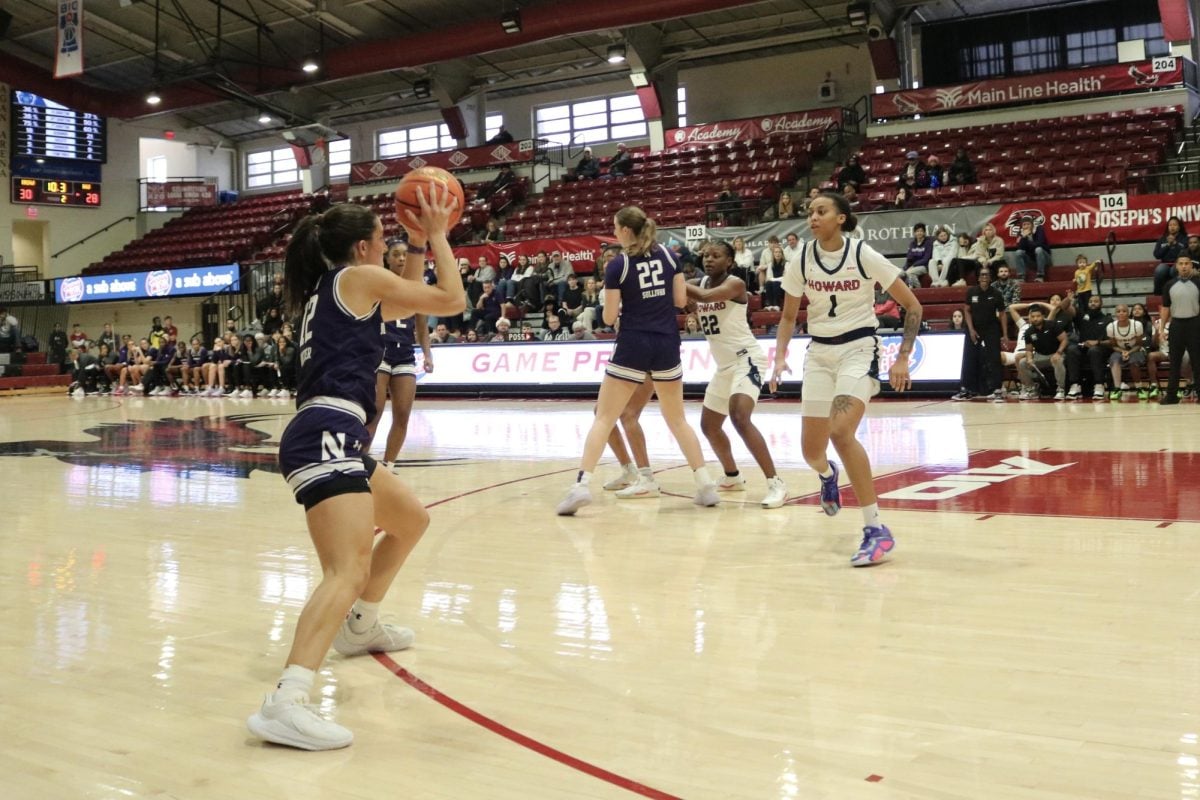Standing over his golf ball in the middle of the 18th fairway, Fran Quinn knew the stakes. The 44-year-old Northwestern alumnus was 169 yards short of the flagstick and had just watched his playing partner, Blake Adams, hit his approach shot safely onto the green in the blustery final-day conditions.
The two shared the lead in the 2009 Albertsons Boise Open at 13-under-par through 71 holes, though they took different paths to reach that score. While Adams had been in first place since the opening round of the Nationwide Tour event, Quinn had never led the tournament outright.
Quinn saw an opening to surge ahead on the par-4 last hole by knocking his second shot stiff. A win would catapult him into the top-25 in Nationwide Tour earnings, the cutoff for receiving a PGA Tour membership the following year. It had been nearly two decades since the Worcester, Mass., native last played regularly at the highest level, and he was anxious to get back.
After consulting his caddy, Quinn grabbed his 8-iron. His main advantage over Adams was familiarity with the course: Quinn was playing at Hillcrest Country Club for the 12th year, whereas Adams had competed in only two prior Boise Opens.
That experience paid off on Quinn’s next swing, perhaps the most important one of his career.
“I had played that golf course enough to know where I had to hit the ball,” Quinn said. “Right when it left my club, I said, ‘Well, that’s as good as I’ve got.’ I thought, based on the crowd reaction, that it was about two inches (away from the hole).”
When Quinn walked up to the green, he discovered that his ball wasn’t quite that close. He still had to make a tricky, downhill three-and-a-half-footer. But after Adams missed his birdie try, Quinn’s putt found the bottom of the cup to give him a one-stroke victory.
With winnings of $130,500, Quinn jumped up to 18th on the money list and seemed to be in an ideal position to secure his PGA Tour card.
“I anticipated after he won the Boise Open, if he played OK, he was more than likely going to make it,” former college teammate Jim Benepe said.
Quinn ended up earning his exemption after all, though the process caused more stress than he would’ve preferred. Of course, nothing has ever come easily during Quinn’s career-not that he gets discouraged. He embraces the opportunity to make a living by playing the game he loves, even if that game doesn’t always love him back.
“Always a foursome”
In New England golfing circles, the Quinn family is like royalty.
Quinn’s father, also named Fran, was a standout amateur golfer in Massachusetts who won various tournaments in the 1960s, including the 1966 New England Amateur Championship. Kevin and Brian, Quinn’s younger brothers, captured the Massachusetts Open in 1999 and 2003, respectively. And Quinn himself claimed a Massachusetts Amateur and Massachusetts Open title.
The Quinn siblings played many different sports as kids before ultimately following in their father’s footsteps. As the eldest son, Fran was the ringleader.
“It was a great way to grow up,” Brian Quinn said. “Frannie kind of nurtured us along the way and helped us all become a little better. He was a great role model for us… Any son looks at his dad, kind of wanting to do what your dad did. Frannie followed my father, and then we all followed him.”
Fran developed his love of golf from tagging along with his father to the course, caddying for Fran Sr. and collecting his hits on the driving range.
“When I first started, I used to shag balls for him,” he said. “When I came in, he let me hit five or six or seven balls. That’s kind of how I got hooked on it.”
Once Fran got older, he worked on his skills at Pleasant Valley Country Club in Sutton, Mass., by playing almost every day during the summer. He often had company, saying one of the benefits of a large family was that, “We always had a foursome.”
It was during his childhood that he developed the work ethic and determination that eventually helped him make it back to the PGA Tour-more out of necessity than anything else.
“When you’re one of seven kids, you’d better have some perseverance,” Brian Quinn said. “He’s always had that. That’s actually the perfect word I would use for him-perseverance. He’s stuck to his program, he knew he could do it, and he did it. He worked extremely hard and has sacrificed a lot.”
Fran became the most successful professional golfer in the family. A back injury forced Brian into coaching after a career playing mostly overseas, and he now leads Temple’s golf program and runs a teaching academy. Kevin made his impact on the amateur level, winning the New England Amateur like his father did.
An Evanston Education
Boasting a strong junior golf record, Fran attracted plenty of attention from colleges. Schools in the Atlantic Coast Conference were particularly interested at first.
Then NU coach Wally Goodwin heard about him from one of his golfers, and the Wildcats entered the picture.
“Frannie came with Michael Stone as a result of me recruiting Jim Benepe,” said Goodwin, who piloted NU from 1981-87. “I was talking to Jim one time, and I said, ‘Jim, who are the two fiercest competitors among the junior golfers you know who would be eligible to come here?’ And he mentioned Mike Stone and Frannie Quinn.”
Quinn was drawn to NU’s combination of academics and athletics, though he joked, “I wish the football team was a little better.” Goodwin’s expertise and personality also played a factor in Quinn’s decision to attend college in Evanston.
Almost immediately after Quinn arrived on campus, Goodwin noticed Quinn needed to make a grip correction with his left hand.
“The way he held onto the golf club, it was just an automatic hook-which is a trait of kids coming out of junior golf,” Goodwin said. “They all have these huge, strong left-handed grips so they can hook the ball and hit it with the older players.”
But Quinn worked hard to make the change, even after graduating in 1987. When Goodwin saw Quinn play at Pebble Beach a few years ago, the retired coach recalled being impressed with his pupil’s smooth swing and consistency.
In addition to compiling high finishes for the Cats, Quinn was popular amongst his teammates.
“One of the most fun players I ever had-always telling jokes, always laughing, always pulling tricks on people,” Goodwin said. “I could just tell the other kids loved him.”
Goodwin also called that team one of the most enjoyable he ever coached, which is high praise coming from someone who later won a national title at Stanford and mentored Tiger Woods.
During Quinn’s NU days, his passion for golf was evident in his practice habits. So his perseverance comes as no surprise to players like Benepe, who had a short PGA Tour career himself and won the first event he ever played in.
“The overriding factor was he really enjoyed playing golf and working at it,” Benepe said. “I did it for 15 years, but for me, it was more of a talent. Whereas Fran, he loved it. I can see where he would stay at it this long.”
The “Crash Davis” of Golf
The last title any golfer wants to hold is “Nationwide Tour veteran.” No one hopes to spend his career toiling in golf’s minor league, where the purses are one-tenth as large as on the PGA Tour. Yet that’s what happened to Quinn.
He tied for eighth at Qualifying School-a brutal six-day test for PGA Tour hopefuls-in 1991, good enough to obtain member status on Tour for the following season. But Quinn didn’t make nearly enough money to keep his card, failing to record any top-10 finishes.At age 27, Quinn said, he wasn’t mentally prepared for his big break. His struggles didn’t faze him, though-he had already conquered Q-school once, so who was to say he couldn’t do it again?
“When you lose your card back when you’re (that young), you think, ‘Oh, I’ll be back there next year,'” Quinn sai
d.
But he wasn’t back the next year. Or the next year. Or the year after that. Quinn became a golfing nomad, playing a few select events on the PGA Tour before finding a home on the Nationwide Tour, which was known as the Nike Tour in the mid-1990s. In fact, the lower tour has had four different sponsors since Quinn started playing on it, with Ben Hogan and Buy.com serving as its other names.
Even when his prospects seemed least promising, Quinn and his family never stopped believing he was capable of competing with the best golfers.
“There were times when I sat there and looked in the mirror and talked to my wife Lori and said, ‘Hey, do we want to keep moving forward?'” Quinn said. “But neither one of us at any time lost faith that we would get back to the top.”
The closest Quinn came to returning was in 1999. He won a tournament and finished 18th on the Nike Tour money list that year, except only the top-15 earners advanced to the PGA Tour. Then at Q-School, he was comfortably inside the cut line on the last day until two double bogeys on his final nine holes left him one stroke short.
Quinn was scheduled to play in two prominent Asian Tour events to cap off the season, but the heartbreaks left him emotionally drained.
“I said, ‘Nah, I think I’ve had enough for this season, I’m going to rest and get ready for next year,'” Quinn said. “And when I came back, my wife was coming in from shopping, getting ready for Christmas and the holiday season. She had a bunch of bags, and I looked at her and said, ‘You know, maybe I should go overseas for a few weeks.'”
It was a blessing in disguise. Quinn became only the second player to win in back-to-back weeks on the Asian Tour and carried that momentum into the next year, winning the first tournament on the newly named Buy.com Tour.
Little did Quinn know, he wouldn’t win again for nine years.
Redemption
The most frustrating part of Quinn’s slump was he could tell his game was improving.
“It’s unfortunate sometimes in the game we play that you set a bar and goals, and sometimes your play isn’t indicative of how well you’re actually playing,” Quinn said.
The problem certainly wasn’t a lack of chances; Quinn just couldn’t close the deal. His best chance to win before the Boise Open was at the previous year’s Rex Hospital Open, in which he was tied for the lead after three rounds. He shot a 6-over 77 on the last day to finish T-12.
Back at NU, Goodwin could tell Quinn was hard on himself when he didn’t play his best. Quinn admitted that issue contributed to his Sunday struggles.
“You wouldn’t notice it externally, but internally I’m a bit of a perfectionist,” Quinn said. “I wanted it too bad-I wanted to get back to the PGA Tour. I wanted to get back to where I felt I belonged. When I got myself in those positions, I really tried way too hard instead of having some fun.”
He consciously changed his mindset in 2009, and it worked. All he had to do after winning in Boise was hang onto his top-25 position for six weeks.
Going into the season-ending Nationwide Tour Championship, Quinn still had a cushion-though his fate hadn’t been finalized. With his brother Kevin, his parents and a few friends in attendance, he was in contention through two-and-a-half rounds, hovering around the top-10. Then Quinn started to feel sick and stumbled on his back nine. He was hospitalized Saturday night, and doctors hooked him up to an IV.
There couldn’t have been a worse time for Quinn to fall ill. But he was so sick that he didn’t even think of the situation in those terms.
“I just knew that I had to somehow finish the golf tournament,” Quinn said. “Before I came down with prostatitis, I was in the top-5 in the field. And then I got incredibly sick. I was fortunate to finish, and I needed to.”
Quinn shot a 74 in his final round and had to wait for the later groups to finish before finding out if he got his Tour card. He went back to his hotel to shower and was called back to the course when he was projected to finish 24th on the money list. By the time he got back, he had fallen to 26th.
“There were definitely a lot of nerves, but I think my family was a lot more nervous than I was,” Quinn said. “I was definitely nervous, but I wasn’t feeling up to par.”
Appropriately enough, it all came down to one shot. Brian Stuard had an eight-footer for par on the final hole that would have cemented him in the No. 25 spot. When he missed, Quinn was officially a PGA Tour member for the second time.
Less than $3,000 separated Quinn from Stuard on the final money list. Had Quinn not been able to finish the tournament, he would have come up short again. Instead his perseverance got him back to the top after an 18-year absence.
“I can say without any hesitation that of any player I ever had, Frannie Quinn has shown me more tenacity in terms of trying to make the pro tour,” Goodwin said. “If there was any kid who would hang in there and hang in there and hang in there, it was Frannie.”
Quinn tees it up at Torrey Pines in San Diego, Calif., on Thursday for the opening round of the Farmers Insurance Open, his first tournament of 2010. The deck is stacked against him, as only 15 of the last 50 Nationwide Tour graduates made enough money to retain their PGA Tour card.
But Quinn is used to overcoming long odds. He wouldn’t have it any other way.[email protected]






